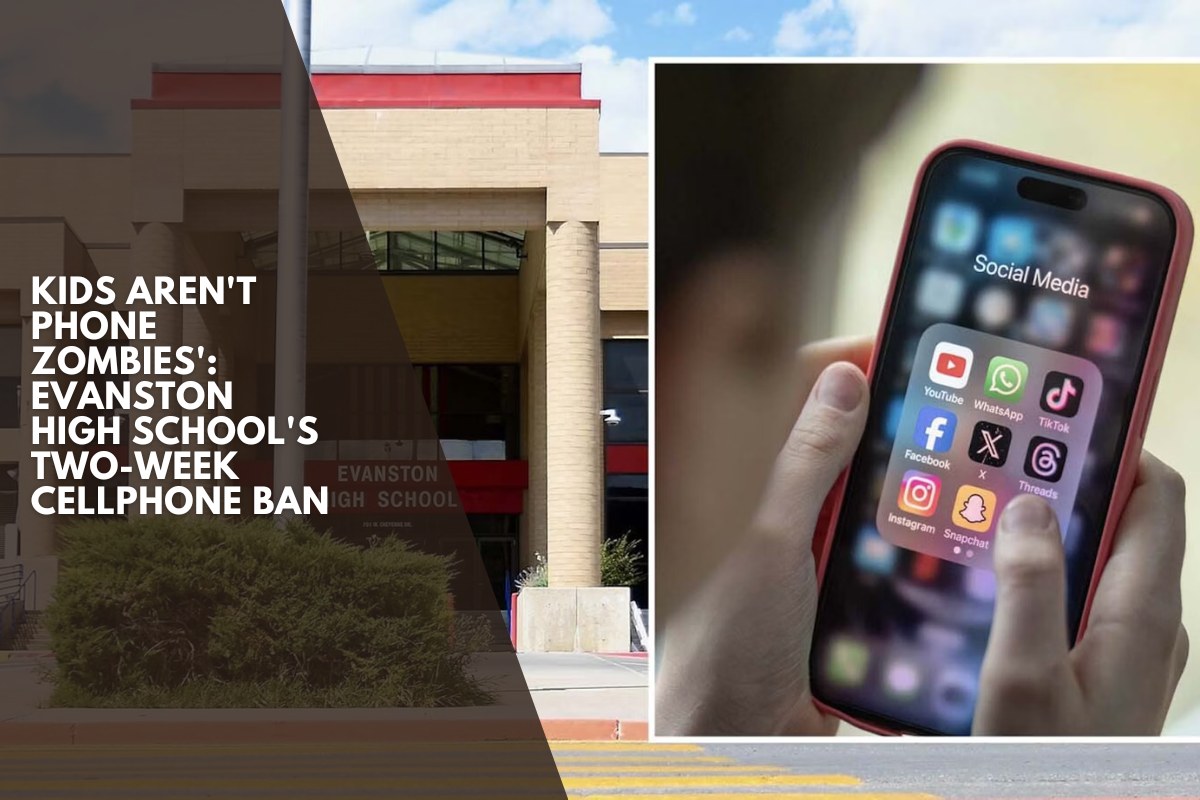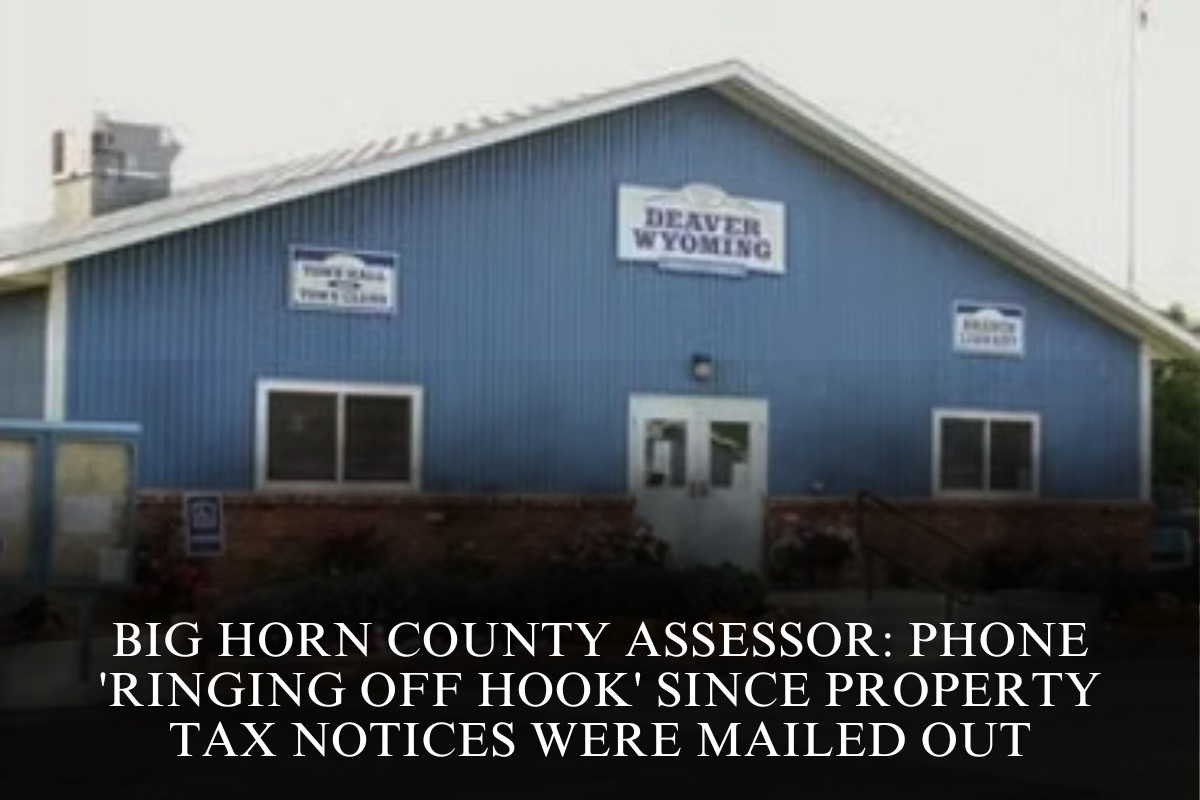EVANSTON — Uinta County School District 1 Superintendent Ryan Thomas recalls the moment he realized children using cellphones in class was a problem that couldn’t be ignored.
“It happened toward the end of not last year, but of the previous school year,” according to him. “I had the opportunity to substitute for one of our advanced math classrooms (at Evanston High School). The teacher posted a sign on the wall in the classroom that read, ‘No Cellphones’.
“I knew that the high school had a policy in place previously that cellphones should be put away during instructional time.”
Thomas saw that, despite the school’s regulation and the teacher’s sign, a few pupils kept their phones out and on their desks while working.
“So I walk back and ask, ‘Please put your cellphones away.'” And these are students that are intellectually strong and work hard,” he told Cowboy State Daily.
“And what I noticed (was) it was more of a habit that when their cellphone buzzed, they had to look at it, even though they knew they weren’t supposed to,” said Thomas. “When I told one girl to put her phone away, she replied, ‘Oh man, I didn’t even realize I was looking at it.'” “And I believed her.”
Now consider the 2025-2026 academic year, which has just begun.
Evanston High School has now established a complete ban on cellphone use during school hours, from the moment pupils arrive until they depart. All phones must be turned off and stored away for the period.
This includes lunch on campus, between classes, bus rides, and school-day assemblies.
And EHS is not the only Wyoming school that has declared a complete ban on smartphone use.
Cody High School in Park County School District 6 has also implemented a total ban, while many other districts across the state are enacting cellphone policies for their schools.
While distraction is usually cited as the main cause for concern, other issues such as cyberbullying and the abuse of artificial intelligence technology have also been singled out.
“There’s been legislation that gives schools the option of how to handle the cellphone issue,” said EHS principal Scott Kohler. “We really started tightening down on the phones last year. We went bell-to-bell at the high school, meaning no phones in class, similar to what other schools had done.
“Some schools have done what we’ve done, some have done partial and some haven’t done anything. It’s interesting when you look at it. But I think most schools are beginning to put something in place.”
Crafting A policy
Last summer, Thomas met with state Sen. Wendy Schuler, R-Evanston, to work on legislation for a statewide ban cellphone use in classrooms and on school grounds during academic hours.
That bill finally became Senate File 21, which perished on the Senate floor.
The issues with cellphones and the distractions they cause persisted, according to Thomas.
“Anticipating that there would be some legislation, we did have a district statement that basically every principal would have a cellphone policy in their handbook,” the teacher explained. “The high school became more restrictive last year.”
It was not surprising that a ban is unpopular among students, but it has also not been uniformly accepted by parents, he said. Some parents want that ongoing connection with their kids.
“We had some bumps in the road, with some parents who didn’t agree, some students who didn’t agree with that cellphone restriction,” he told me.
Thomas also researched what other school districts were doing throughout the country and, after consulting with the nine members of the local school board, determined that the district would prohibit cellphone use during instructional time.
“We decided that from the time students step on the bus until the time they step off again at the end of the day, those cellphones should be put away,” he told me. “If a kid or parent prefers, they can keep them in their backpack, locker, or vehicle.
“But they are not to be on during the school day.”
When asked what the first two weeks of the school year have been like with the new policy in place, Kohler suggested the answer may not be as bad as you think.
“Overall, it’s been a smooth transition,” he told me. “It’s a difficult transition (since) it requires a change of habits. I don’t know if anyone loves this rule, but everyone understands why we have it.
Laura Clarito, an EHS English instructor, stated that the prohibition had no effect on her classroom. She has had a no-cellphone rule in her class for a few years. For her, the change has been in kids’ attitudes.
“Since cellphones were disallowed, I have seen more engagement in coursework and more conversation during downtime,” says Clarito. “Kids aren’t phone zombies now, they are humans.”
Fellow English instructor Jacob Zufelt stated that his students are not bashful about expressing their discontent with the restriction.
“They’ll tell me, ‘It’s not fair’ or ‘You should talk to the school board for us,'” according to him. “I am glad I don’t have to deal with youngsters on their phones in my class, but I believe lunchtime or on the bus would be appropriate times to use phones.
“If the new policy is doing anything to decrease cyberbullying and harassment, then that’s great.”
Breaking It down
Some schools collect cellphones from students as they come through the doors in the morning, giving them back when school’s out.
Not at Evanston High School, where students can keep them as long as they are switched off and kept out of sight.
“The language we have is ‘stowed away,’ which means the phones are put in a certain place and powered off,” Kohler proceeded. “So, they can leave it in their locker, their backpack, their car, or at home. It cannot be in their pocket or on their person.”
Some classes offer boxes where students can store their phones, while others can leave them in the office for the day if they want.
“That’s just a handful of kids,” Kohler remarked. “But any of those examples are considered stowed away.”
In terms of enforcement, Kohler stated that the most challenging challenge is habit adjustment because students have grown accustomed to having their phones as an extension of themselves and find it difficult to function without them.
“It’s, ‘Oh, it’s lunchtime, let me grab my phone,’ and they grab it without even thinking,” Kohler recalled. “We haven’t been hammering them with detentions and consequences just yet.”
There is a sequence of actions that officials will conduct if pupils breach the policy.
“The first step will be the phone will be taken to the office and the kid can pick it up at the end of the day,” Kohler told me. “The second stage is for the phone to arrive to the workplace, where the parent will pick it up.
“If there’s any beyond that, then we look at meeting with the parents and the kids, deciding if it’s becoming an insubordination issue.”
Students who forget their phones are in their pockets as they walk in the door and scramble to stuff them into their bags have become the norm, but they’re catching on quickly, according to Kohler.
“Once kids have it figured out, it’s been fine,” he told me.
According to Kohler, feedback from teachers and parents has been mainly good, although the administration has had to deal with a few unexpected concerns.
“There have been kids who have let us know they don’t like it, as well as some parents,” he told me. “But they have all been respectful. A typical child would tell you that they dislike it, but they understand why. The same has been true for the parents.
“Some people have contacted to express their worries, and they have all been respectful. Change is difficult, and it will take some time before we can all agree on what to do. I’ll say everything went more smoothly than I expected.”
Too Restrictive?
The policy is not without its critics.
Erica Bailey, whose son Jayden is a senior at EHS and a member of the Red Devils football team, feels students must focus in class, but a blanket ban on cellphones is not the solution.
“Teachers know their students best and should be trusted to decide when phones are appropriate in their classrooms,” she said in an interview with Cowboy State Daily. “There are other situations when restricting access makes little sense, such as during long bus rides for school excursions or sporting activities.
“My primary worry as a parent is safety. I need to be able to reach my child in an emergency, and my son needs to reach out to me when he is struggling.”
At the same time, if pupils are disengaged, parents should inquire whether the lessons are retaining their attention, Bailey noted.
“Phones can be a distraction, but they aren’t the root of the problem,” she told me. “We should focus on creating engaging classrooms, clear expectations and balanced policies that put responsibility on both students and faculty.”
Fellow parent Kati Baxter concurred.
“It’s horribly inconvenient when I’m trying to communicate to my own kids about appointments or a change of plan that affects them,” she told me. “But we’re adjusting … and also getting to know the school’s secretaries all too well as she relays our messages.”
Thomas said he understands parents’ concerns, but believes the school administration is more than capable of addressing such calls in a timely manner.
“Our message is that a parent can always call the office and we’ll get to your student very quickly, and a student that has an emergency can always call home using our phone,” he told me. “We’ve done that forever, and if you need to make arrangements after school, you can do that through the office, or your students can turn their cellphones on after school.”
Even if it’s uncomfortable and unpopular, Thomas believes cellphones in schools have become such a problem that something must be done.
“We’re trying to be understanding, but at the same time, I think the research is definitely pretty clear that it is a disruption to the day and students are better off to have those off during instructional times,” according to him.
Students Chime In
Student reaction has been decidedly mixed.
For sophomore Seth Morrow, 15, being disconnected from a cellphone is not only a safety issue, it also relates to social acceptance.
“If there was an instance where there was a lockdown, and you were in the bathroom and you weren’t allowed to have your phone on your person, you could be scared and might not know what’s going on, you can’t contact anybody,” he told me. “Some professors may be unaware of your location, putting you in more danger.
“And just during lunch, not being able to have your phone — especially if you struggle socially — it’s hard to just sit there and not have anything to do.”
Fellow sophomore Rafael Ballardo, 15, acknowledges that cellphones can disturb schoolwork. He wants officials to understand that cellphones might help kids alleviate stress, especially after a particularly difficult lesson.
“When the school took that away, I feel like we’re more stressed, because we can’t relax by watching TikToks, or answer Snaps or play video games,” Ballardo said me. “Just doing things I enjoy.”
That is not to claim that every student feels this way.
“It’s not like it’s a horrible thing,” Hayden Hasler, 15, said. “We all need to unplug, because everyone is constantly on their phones. Our parents did not all grow up staring at their phones all day. I don’t believe we need to either.”
“I think it’s kinda nice,” remarked 15-year-old Karlee Moon. “We don’t have to worry about the effects of social media, and there are fewer individuals on their phones walking down the halls. It got incredibly cramped when everyone wasn’t looking where they were going.”
When asked if not having her phone for lunch was a major concern, Moon responded no.
“You need to talk to your friends,” she replied.
Regarding lunch, Principal Kohler stated that the EHS lunchroom, which was formerly a wasteland of bowed heads and texting fingers, has transformed in the last two weeks into a vibrant, boisterous, and engaged hub of activity.
“When should kids socialize and have fun? “Well, when they’re eating together,” Kohler explained. “Rather than using their phones at lunch, it’s astonishing how much noise and visiting we’ve seen this year alone.
“Suddenly, youngsters start talking and associating with one another. We’ve had more books read and checked out from the library. It’s simply beautiful to watch.”
Similar Results In Cody
Cody High School has a total cellphone ban, said Principal Mitch Espeland, who has been just as pleased with the results.
“It’s going really well here,” Espeland reported. “We have a pretty strict policy where students are not allowed to have their cellphones from 7:30 a.m. — when our doors open — to 3:20 p.m., which is our last bell.”
Unlike at EHS, Cody High students turn in their phones to administrators during the day. Most students avoid bringing cellphones because they know they will be detained, according to Espeland.
He mentioned that in Evanston, there are many more students socializing with one another.
“I think the coolest thing I’ve seen is, our common areas are really loud this year — students engaging with their friends, with their peers,” added the instructor. “When I go into classrooms, I’m seeing almost 100% engagement in the lessons instead of distractions.”
Longtime CHS band director Wade French was originally wary about the restriction, fearing that staff would struggle to enforce it. Additionally, cellphones played a significant role in how he taught his lessons.
“As high school band directors, we use phones in class for tuners, metronomes, and recording,” French told Cowboy State Daily. “I would occasionally send texts to my band courses with announcements, important class and travel information.
“I also record images and videos of my classes on the fly to discuss how we’re doing and where we can improve. The same thing was happening during in-class sectionals.
Much to his surprise, the college community appears to have embraced the idea, with students taking joy in self-policing.
French has altered his curriculum accordingly, and while it is still early in the game, he is satisfied with the outcomes.
“Our campus is a new place, and it is amazing,” French added. “Students are engaged and productive in class. They’re paying attention and asking questions. When students are given time to accomplish homework in class, they complete it and turn it in.
“When that is done they are talking and smiling, chatting with peers instead of looking down or taking a Snapchat.”
Running It Back
For state Senator Schuler, the failure of SF 21 during the last legislative session only strengthened her resolve to push it through.
“I intend to bring it back,” she told the Cowboy State Daily. “There were still some people who said, ‘Well, there are some districts that are already trying some things, and we should just give them a chance to see what works for them.'”
“And I said, ‘Well, I understand that we all love local control, and I agree with that, but I felt like I had enough flexibility in there so that they could still have it.'” But some senators disagreed with me.
Schuler will amend the law to make it more local-control friendly, emphasizing that if a disciplinary plan is important enough in your school, so is a cellphone plan.
“And there are districts that don’t have any plans thus far,” Schuler informed the audience. “They don’t have any policies stating what kids can and cannot do with their cellphones.”
Schuler, a longtime educator, retired from teaching in 2016. After being elected, she began hearing from teachers around her county who were spending an abnormal amount of time regulating children with their cellphones.
After reading Jonathan Haidt’s book “The Anxious Generation” about the risks of phone-based childhoods, Schuler decided to take up the issue.
“Once I’d read the book about just the increase in teen suicide and cyberbullying — and there’s so many negative things with social media that have come out of cellphones — it just opened my eyes,” according to her. “I thought, ‘Wow, we’ve got to do something, at least for instructional time.'”
Schuler said it may be difficult to sell to her fellow legislators during the 2026 budget session, but she will continue to work on the bill.
Meanwhile, she is thrilled that the district where she taught for many years has become a litmus test for cellphone policy.
“Our district is going a step further, and I hope others do, as well,” Schuler stated. “I just want to focus on what is best for them and do whatever we can to help them as much as possible. That’s how I see it.












